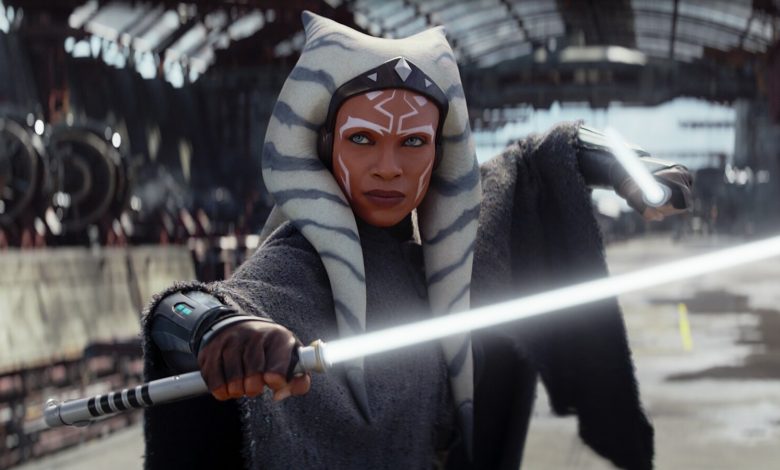Ahsoka is Slow, but Moving When it Counts

Charlie von Peterffy / Emertainment Monthly Staff Writer
The latest Star Wars TV show, Ahsoka, is a relatively sturdy continuation of showrunner Dave Filoni’s Mandoverse. It provides organic, unexpected character study for old and new faces, stellar visual flare, and well-crafted fan service. Unfortunately, stretching this narrative over eight episodes slows everything down to a snail’s pace, diluting the intensity and forward momentum it should’ve had. Much of the acting also feels relatively detached, making the characters flat aside from their franchise-famous names (though the cast is not to blame). Because Ahsoka focuses heavily on building the larger narrative, as in many other recent Filoni works, it does little to attract new viewers or enlighten them on larger contexts. This complication rings especially true for fans or newcomers who never watched Disney XD’s Star Wars Rebels in the 2010s, as this story directly continues those threads. Fortunately, when the cast can express themselves, the vital story beats swing into motion, and the action cranks, Ahsoka brings intellect, heart, and fun to Star Wars in new and familiar ways.
Taking place several years after Return of the Jedi, and continuing storylines introduced in Rebels, The Mandalorian, and The Book of Boba Fett, this show follows Ahsoka Tano (Rosario Dawson), the fan-favorite apprentice of Anakin Skywalker/Darth Vader (Hayden Christensen), as she tries to track down threatening Imperial remnants headed by decorated leader, Grand Admiral Thrawn (Lars Mikkelsen). Having been shot through hyperspace somewhere into the Unknown Regions of the galaxy along with Jedi Ezra Bridger (Eman Esfandi), Tano finds hints of their whereabouts. Balancing between finding Thrawn, training her struggling apprentice Sabine Wren (played by Natasha Liu Bordizzo and another Rebels return), political disputes within the New Republic, and stopping enemies’ similar search for the ex-admiral, Ahsoka must face her past to conquer her present and secure the future. Otherwise, she, her friends, and the galaxy could face grave peril.
The story is well-rounded and intriguing, but it should have been shorter. In almost every episode, scenarios unfold slowly. Silences take unrealistically long; people ramble; big action sequences take minutes instead of seconds, and decisions are made painfully slowly. Also, there should have been only five or six episodes, given that the first three drag. Nevertheless, the series’ strengths are robust. The narrative unfolds like a poetic epic, with emotional, evocative, and dramatic moments. The creators may have stretched the series too thin, but it is still enjoyable and profound at its core.
The actors, though frustratingly restrained, shine when they can. For most episodes, everyone seems directed to remain collected and calm; each actor portraying similarly unaffected expressions in times of (usually) grave distress, anger, or any other intense emotion. When they are allowed to be more vulnerable, they display passion and nuance. The cast should have been allowed more emotional presence; they feel unnaturally detached. The characters are reasonably well-rounded, but their development drags with the sludgy pace of the narrative. The dialogue and writing are generally poignant, evoking the more effective poetic speech patterns of George Lucas’s Star Wars trilogies. But again, the pace and restricted emotional direction hinder the characters.
The visuals and sound design are satisfying. Like all of the rest of Star Wars, Ahsoka provides swift action choreography, a thronging soundtrack, stellar makeup, and set design for the eyes and ears to enjoy. These may well be the components that appeal most to new audiences. With the primary story highly dependent on some of its predecessors, and with little contextual explanation or introduction, the show can otherwise confuse new audiences. The showrunners should have dedicated more time to enticing new viewers to gaze at the Star Wars mythos and universe instead of pure, decently structured fan service. The visual ambitions and dramatic sounds certainly help, but more accessible story scaffolding is necessary.
Ahsoka is a compelling––though long-winded––series with the spotlight on the titular Jedi and post-Empire Star Wars. It may drag a lot and assume knowledge of the franchise’s canon, but it ultimately provides enough enlightening direction, thoughtful character work, satisfying twists, and grand scope to appeal. For Star Wars fans, this will probably please, at least in its good moments. Despite its muddy and uninformative march forward, it is also a relatively exciting space drama for non-fans.